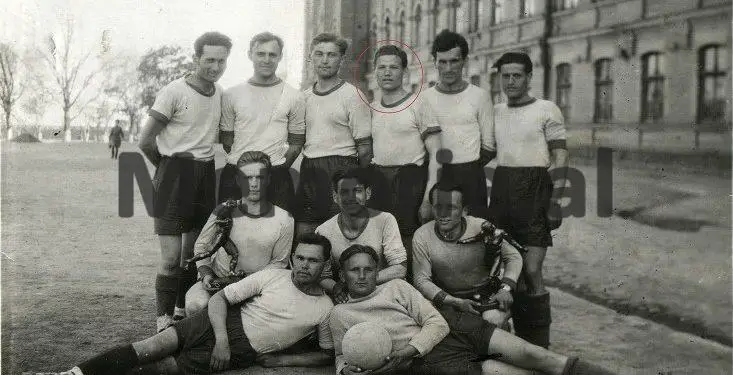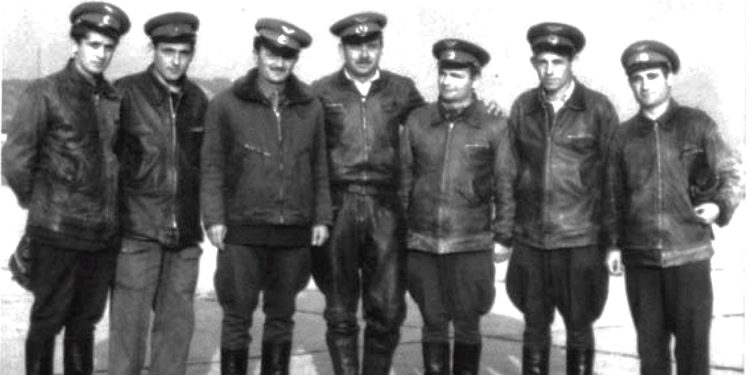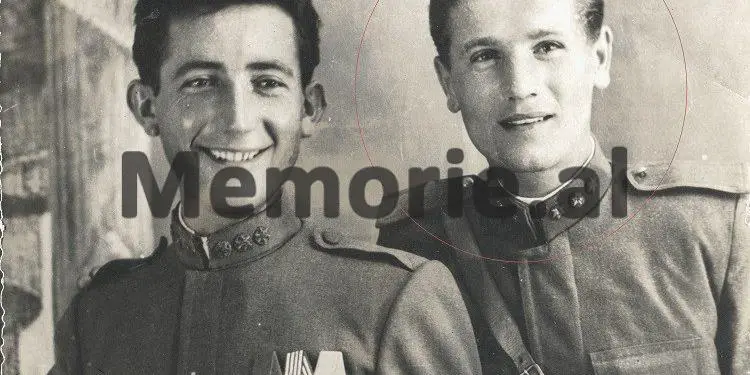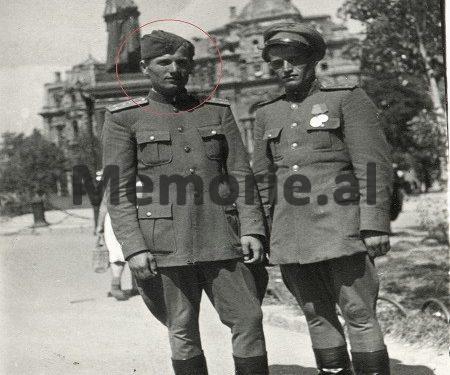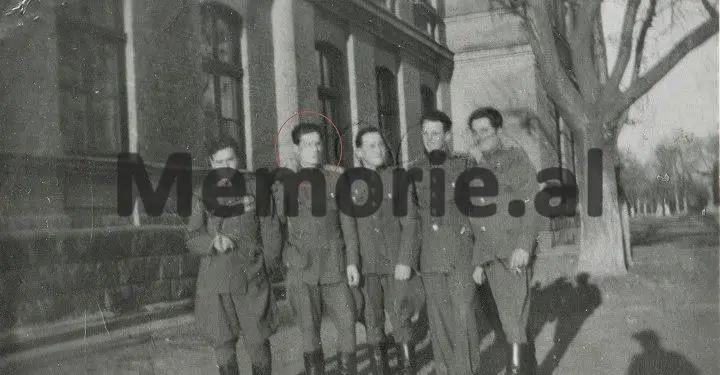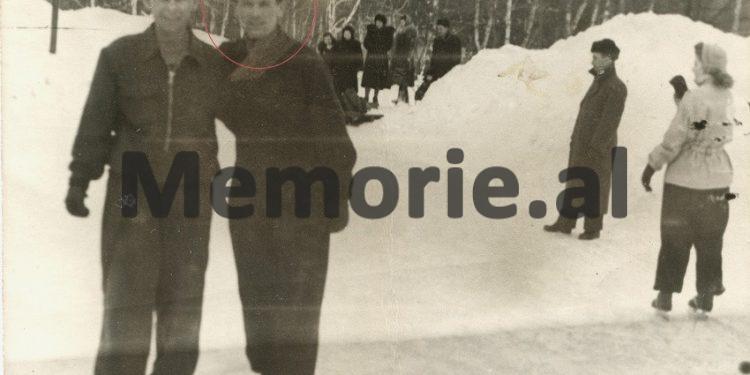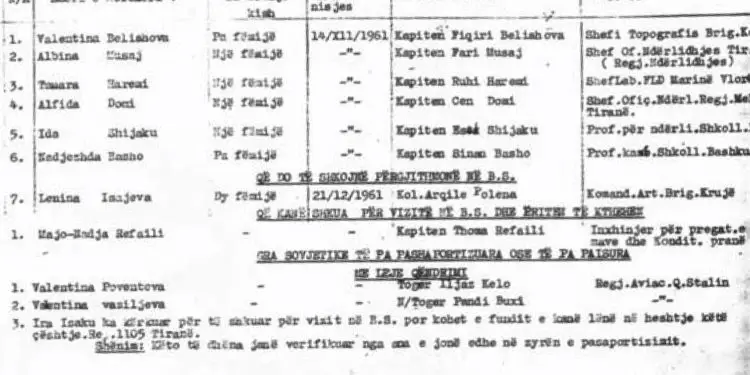By Alqi Koçiko
Haxhi Lleshi’s letter: “Let Captain Idajet Kokaj, who is asking us for permission to marry a Russian girl, is informed that his first duty is to carry out the duties assigned to him by the Party, the Supreme Commander and the People”!
Memorie.al / They came from the war. The vast majority was indeed of “half shoe” origin; even someone who came from a better-off family had squandered their wealth. While those who had “seen the world with their eyes” could be counted on the fingers of their hands, it was more than understandable that the metamorphosis, for better and for worse, of the Albanian soldiers whom the communist dictatorship sent to study in the famous schools of the Soviet Union, was very noticeable.
This large group of people, who set the tone for the war on the Albanian soil, would do the same for that part of the Cold War, which fell to Albania. They returned to command the army of their country, they tasted the glory and the pains, the discontents and the ranks, and many of them in the end, suffered it.
The reason is already known: the great friend had turned into the great enemy. But the dramas in such cases take on multiple dimensions, even more so when they move from the professional to the human and personal level.
Because for them, the separation of Enver from Khrushchev, the breakup of Albania with the Soviet Union and most of the countries of the Socialist Camp, automatically meant the separation of their Russian wives. The knife of irony goes even deeper: Someone, before deciding to connect his life with his Russian romance, was divorced from his previous Albanian wife.
The urgent need of the new government to come out of the War, for genuine military personnel, as well as for civilian professionals in various fields, had found the solution: Education in the schools of the “People’s Democracies” of the East, mainly in the Soviet Union.
Undoubtedly, the selection of the elements was scrupulous, while the criteria were political. Prominent war commanders, then leading leaders of the state, starting with Mehmet Shehu, studied at the Soviet “Harvard” of military schools, the “Voroshilov” Academy, where major officers of the General Staff were trained.
Immediately after, came the “Frunze” Academy, which produced leaders of infantry brigades and divisions; Academy “Zhukovsko”, for aviation; “Zherzhinsky” Academy of the KGB; “Stalin” tank academy, etc.
With the exception of those of “Voroshilov” and “Frunze”, the vast majority of Albanian students had to start their studies from the basic military school, “Uçilishte”, divided according to branches and where the first start was language learning.
After that, came the Officer Course and then the Academy, as the highest stage. But all this, as it turns out from some documents of the Central Archive of the Army, was translated into the exemplary rigor of the Soviet school, combined with the infamous frost of the Russian winter, something unknown, even for yesterday’s partisans, of the mountains of Albania.
Here is what a report by Albania’s long-time military attaché in Moscow, Sadik Bocaj, says:
“Especially what has hit them the most has been the strong discipline, this discipline, which killed partisanship. Our people were not used to such discipline, so it seemed terrible to them, and even more so since it was winter, they were not used to such a Russian cold. They weren’t used to it, I got ready in two minutes and, when I got in line… I made the presentation to the superiors, all right; these people were not used to being guards, sweeping and cleaning the floor for me, the needy”!
Many reports of Sadik Bocaj and his assistant, Vasil Skorovoti (the latter sent special reports on the work of his boss, as part of his special mission), talk about the ideal Soviet Union, for which Albanian students, had heard so much, in the face of the grim reality of the Soviet Union, about the high prices and post-war poverty, about pickpockets who stole before their eyes, and about the bad food of military canteens. But if for many reasons the former partisans were disappointed by the great mother Russia, this disappointment would be compensated by a single element: Russian girls.
1957 letter
The Directorate of Personnel in our Ministry of Defense sends a message to the military attaché in Moscow: “Along with this letter, we send you the letter of my friend Shpresa Lufo, with which she complains about her husband, trainee Riza Lufo, who studies at the Leningrad Navy School, because he hasn’t received letters since a year, and finally, he notified her of a divorce. His case should be looked at seriously and upon the return of the letter, we should be notified of the outcome”.
The contact of Albanians with Russian girls has caused other dramas of this type, causing the Albanian authorities to face a problem unknown before. Marriage with foreign citizens was not foreseen, while later, a complicated procedure was found. The first reactions, however, were strict, as stated in this letter from 1951, signed by Haxhi Lleshi, the Director of Personnel, in the Ministry of People’s Defense:
“Captain Idajet Kokaj, who is for military studies in the Soviet Union, has addressed a request to this directorate, to intervene with the competent Soviet bodies, to allow him to marry a Soviet girl. To inform the aforementioned, that his first task is to accurately perform the tasks assigned to him by the Party, the Supreme Commander and the People, coming out with good results in lessons and benefiting as much as possible from the valuable Soviet experience. As for his marriage and that of other comrades, the command considers their requests…”!
It was the Tirana-Moscow honeymoon years. And requests for brides from a distant country began to flow, year after year. The Russian girls appeared at the Albanian embassy in Moscow with their requests, while the Albanian officers led prayers in Tirana. The documents that had to be completed consisted of:
1.-Prayer of the interested party together with his biography;
2.-the detailed biography of the foreign girl and her exact address;
3.-health certificate and citizenship certificate;
4.-judicial and courtesy certificate (which meant her political position).
If the file was approved, the Albanian Foreign Ministry was notified, which contacted its Soviet counterpart. But the interesting fact is that at least until 1951, not even the Moscow government was ready to allow marriage with foreign citizens, including Albanians.
The Russian girls appeared in groups near our legate and presented their requests: Valentina Kovaliova for Nako Papavangjeli, Ana Derera, for Thanas Gjiknuri, Lidia Perestjuk, for Zenel Minarolli, Ludmilla Sitnik, for Vaskë Kosta, Galina Vinokurova, for Raqi Sello, Tatjana Llomejko , for Areteo Konomin, Irena Onokjenko, for Peço Polena, Sjagadjat Aitova, for Vasil Gjikondi, Ludmilla Denisovoj, for Vasil Prifti… and the lists are long.
Of course, most requests, after such an influx, began to be approved and marriages began to take place. Nadja, with Rako Germeni, Beba, with Arqile Papadhimitri, Gojogana, with Gligor Konomi, Galina, with Shaban Reci, Veronika, with Mujo Sokol, Valentina, with Qamil Poda, Nona, with Stavri Qeleshi, Lida, with Skënder Godo, Aleksandra, with Shaqir Kapexhiu…!
Albanian students, in Simferopol, Ryazan, Kiev, Kharkiv, Saratov, Leningrad, Moscow, etc., had found. Not just comfort, but their joy of life. And not only those who got married, but many others. they found the ray of light to get out of the gloom of strict military life, precisely in their relationships outside of school, with Russian women.
Kadare gave abundant descriptions of this epic in his works, as is already known, the first and bitter marriage of Dritëroi the great, with his Russian wife, with whom he also had a child, Arjani. But the underground side of this medal, were the secret reports, that the commanders of the student groups, prepared for the behavior of their friends, where, in addition to the progress in lessons and the “life of the party”, all the “defections”, i.e. the commitment according to their, excessive with women.
Here is an early report from 1946, by Sadik Bocaj:
“Of the most undisciplined elements, they are; Captain Stavri Qeleshi and Lieutenant Xhemal Shehu, who already during the trip to the Soviet Union, in Romania, are separated from their friends, leaving behind girls…”!
In another letter, he asks each of the group leaders to send a detailed report every month, “even more often, if you find it necessary”! Further, there will always be some denunciation, for violating the exit permit, for insulting the superiors, and even for stealing rubles, between each other. Of course, entertainment costs money.
But as the 60s approached, the situation would change radically. The representative of Albania, close to the Warsaw Treaty, Dilaver Poçi, wrote to the minister Beqir Balluku, on October 23, 1961, about the numerous complaints for breaking discipline, which the Soviet general Gusiev had made against the Albanian students, especially those who studied in Krasnodar and Ryazan. The cooling between the two countries was already a fait accompli and under discussion were the interruption of studies and the return of Albanian students to their homeland.
Very significant is the “highly secret” letter of General Halim Ramohitos (expelled very quickly from the Soviet Union, as a non-grada), sent to his superiors in Tirana:
“On January 1, 1961, in the 38 academies and military schools of the Soviet Union, we have a total of 876 soldiers, of these, 594 trainees and 282 officers. Of the Ministry of Defense, there are 759, of the Ministry of Internal Affairs, 117”!
And Ramohito, talks about the correct political attitude of the Albanians, while in the bilateral political vocabulary, the terms were commonly heard; “revisionist”, “traitor” and “Albanian stubborn”!
But what really deserves the “secret” logo is the following:
“We have about 10 military men who insist on getting married here. Despite our explanations, these friends do not obey. Their number can be even greater…! From the experience we have, all the bad cases we have here with the military are based on the relationship with the girls…! The issue of marriages is also taking on a political character. We have recently had two cases.
Cadet Luan Çakërri, as you know, we returned him to Albania without taking the state exams, because he had whispered that; “I will not return to Albania without my wife”. We allegedly gave him permission to go to Albania, to fix the marriage issue, and he stayed there. We also wanted to return the captain of the Navy, Idrizi, because in Baku he got involved with a girl and left his studies altogether. He came here to Moscow and secretly ran away from our hotel to Leningrad. There we caught him and escorted him to Moscow and from there to Albania…”!
They used to be seen with envy, but then came the days when Russian marriages were the bane of Albanian officers. Some broke up, some defended their life partner. As is the case of Hamdi Arapi from Vlorë, who did not separate from Raja: “She was a seamstress in the Soviet Union, she is a seamstress in Vlora. What harm has he done to you?! He would shout to the face of the Albanian authorities. After 1992, he went to his wife’s hometown in Borisoglepsk, where the famous Aviation School “Chkallov” is located.
But many women, with and without children, returned to their homeland, while most of the officers of the Soviet generation would suffer one after the other, because already, education in the Soviet Union was seen as; “stain in the biography”! From the highest military, to the captains, the cleaning of the ranks of the army and its Chineseization would begin. /Memorie.al




